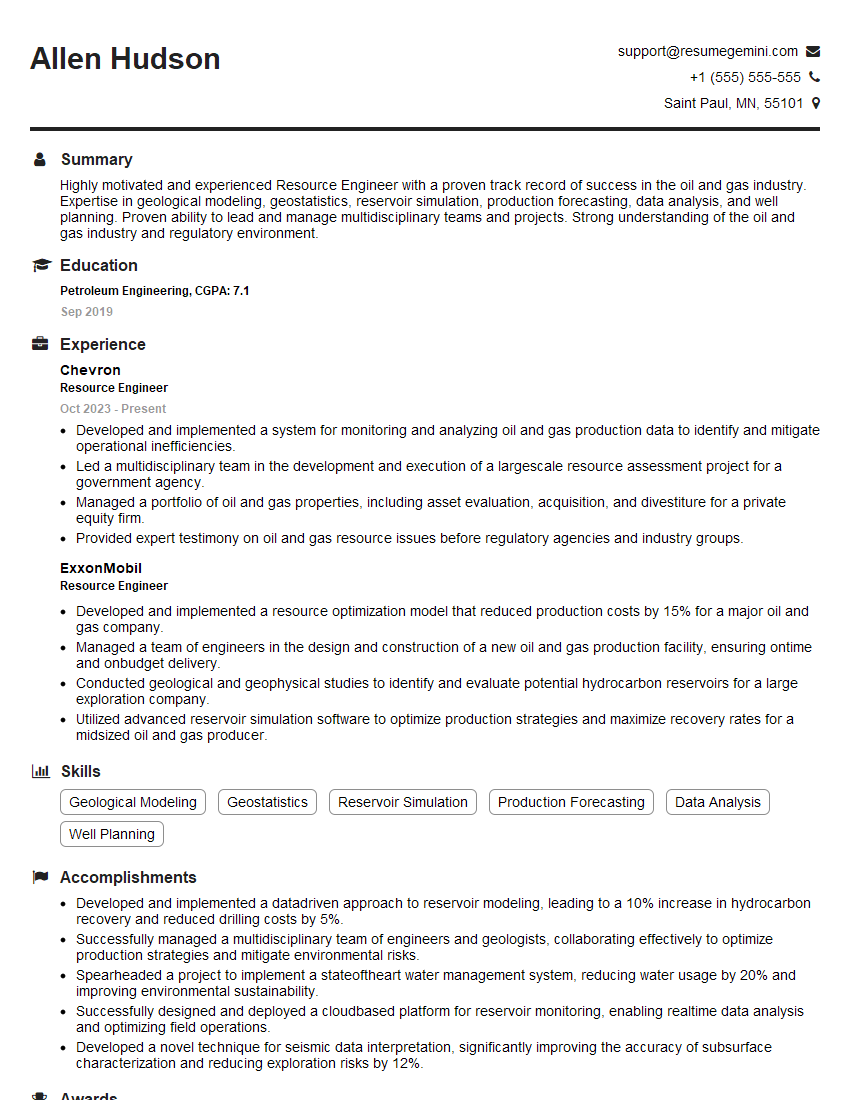Are you a seasoned Resource Engineer seeking a new career path? Discover our professionally built Resource Engineer Resume Template. This time-saving tool provides a solid foundation for your job search. Simply click “Edit Resume” to customize it with your unique experiences and achievements. Customize fonts and colors to match your personal style and increase your chances of landing your dream job. Explore more Resume Templates for additional options.

Allen Hudson
Resource Engineer
Summary
Highly motivated and experienced Resource Engineer with a proven track record of success in the oil and gas industry. Expertise in geological modeling, geostatistics, reservoir simulation, production forecasting, data analysis, and well planning. Proven ability to lead and manage multidisciplinary teams and projects. Strong understanding of the oil and gas industry and regulatory environment.
Education
Petroleum Engineering
September 2019
Skills
- Geological Modeling
- Geostatistics
- Reservoir Simulation
- Production Forecasting
- Data Analysis
- Well Planning
Work Experience
Resource Engineer
- Developed and implemented a system for monitoring and analyzing oil and gas production data to identify and mitigate operational inefficiencies.
- Led a multidisciplinary team in the development and execution of a largescale resource assessment project for a government agency.
- Managed a portfolio of oil and gas properties, including asset evaluation, acquisition, and divestiture for a private equity firm.
- Provided expert testimony on oil and gas resource issues before regulatory agencies and industry groups.
Resource Engineer
- Developed and implemented a resource optimization model that reduced production costs by 15% for a major oil and gas company.
- Managed a team of engineers in the design and construction of a new oil and gas production facility, ensuring ontime and onbudget delivery.
- Conducted geological and geophysical studies to identify and evaluate potential hydrocarbon reservoirs for a large exploration company.
- Utilized advanced reservoir simulation software to optimize production strategies and maximize recovery rates for a midsized oil and gas producer.
Accomplishments
- Developed and implemented a datadriven approach to reservoir modeling, leading to a 10% increase in hydrocarbon recovery and reduced drilling costs by 5%.
- Successfully managed a multidisciplinary team of engineers and geologists, collaborating effectively to optimize production strategies and mitigate environmental risks.
- Spearheaded a project to implement a stateoftheart water management system, reducing water usage by 20% and improving environmental sustainability.
- Successfully designed and deployed a cloudbased platform for reservoir monitoring, enabling realtime data analysis and optimizing field operations.
- Developed a novel technique for seismic data interpretation, significantly improving the accuracy of subsurface characterization and reducing exploration risks by 12%.
Awards
- Received the Excellence in Resource Management Award for streamlining processes and optimizing resource allocation, resulting in a 15% increase in efficiency.
- Recognized by the Society of Resource Engineers for innovative techniques in geological modeling, improving accuracy and reducing exploration risks.
- Received the Young Professional of the Year Award from the Canadian Institute of Mining, Metallurgy and Petroleum for outstanding contributions to the resource engineering field.
- Recognized for exceptional leadership and innovation in sustainable resource management by the Association of Petroleum Engineers.
Certificates
- Registered Professional Engineer (PE)
- Certified Petroleum Geologist (CPG)
- Drilling Engineering Certification (DEC)
- Production Engineering Certification (PEC)
Career Expert Tips:
- Select the ideal resume template to showcase your professional experience effectively.
- Master the art of resume writing to highlight your unique qualifications and achievements.
- Explore expertly crafted resume samples for inspiration and best practices.
- Build your best resume for free this new year with ResumeGemini. Enjoy exclusive discounts on ATS optimized resume templates.
How To Write Resume For Resource Engineer
- Quantify your accomplishments using specific metrics whenever possible.
- Highlight your experience with industry-specific software and technologies.
- Tailor your resume to the specific job you are applying for.
- Proofread your resume carefully before submitting it.
Essential Experience Highlights for a Strong Resource Engineer Resume
- Develop and implement resource optimization models to reduce production costs and maximize recovery rates.
- Manage teams of engineers in the design, construction, and operation of oil and gas production facilities.
- Conduct geological and geophysical studies to identify and evaluate potential hydrocarbon reservoirs.
- Utilize advanced reservoir simulation software to optimize production strategies and maximize recovery rates.
- Develop and implement systems for monitoring and analyzing oil and gas production data to identify and mitigate operational inefficiencies.
- Lead multidisciplinary teams in the development and execution of large-scale resource assessment projects.
- Manage portfolios of oil and gas properties, including asset evaluation, acquisition, and divestiture.
Frequently Asked Questions (FAQ’s) For Resource Engineer
What is a Resource Engineer?
A Resource Engineer is responsible for the evaluation, development, and management of natural resources, such as oil, gas, and minerals. They use their knowledge of geology, engineering, and economics to find and extract these resources in a safe and efficient manner.
What are the different types of Resource Engineers?
There are many different types of Resource Engineers, including petroleum engineers, mining engineers, and environmental engineers. Each type of engineer specializes in a particular type of resource.
What is the job outlook for Resource Engineers?
The job outlook for Resource Engineers is expected to be good over the next few years. As the world’s population continues to grow, the demand for energy and other resources will increase.
What are the educational requirements for Resource Engineers?
Most Resource Engineers have a bachelor’s degree in engineering, geology, or a related field. Some employers may also require a master’s degree or PhD.
What are the skills and qualities of a successful Resource Engineer?
Successful Resource Engineers have a strong understanding of geology, engineering, and economics. They are also able to work independently and as part of a team. They must be able to communicate effectively with both technical and non-technical audiences.
What is the average salary for Resource Engineers?
The average salary for Resource Engineers is around $100,000 per year. However, salaries can vary depending on experience, education, and location.